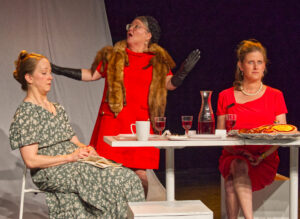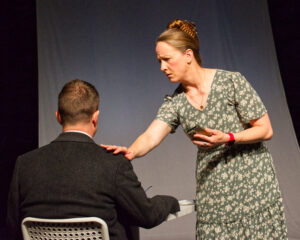
Photo Credit: Wayne Hall
WINSTON-SALEM, NC – It’s so mundane as to be profoundly comical: an annoying cell phone rings incessantly while you are trying to enjoy your soup, and its owner can’t even be bothered to answer it.
That’s the opening scene in Spirit Gum Theatre Company‘s spritely production of Sarah Ruhl‘s Dead Man’s Cell Phone, which runs on weekends through April 14 at Mountcastle Forum in the Milton Rhodes Center for the Arts, 251 N. Spruce St., Winston-Salem.
Turns out, there’s a pretty good reason that the man at the table doesn’t answer his phone. Jean, played with ethereal transparency by Ann Breitbach, goes over to the man’s table in an effort to get him to pick the darn thing up. In desperation for a little peace and quiet, she gives him a little poke on the shoulder, and he … droops.
Yep. He’s dead all right.
On an impulse, Jean answers the phone, and thus begins the adventure of her previously dull, rather lifeless life; we later learn that she not only works in the Holocaust Museum but also in the back of the Holocaust Museum.
Up till now, for all we know, Jean spends most of her time hidden away from the world, so it’s fun to see her become energized by another person’s reality – one that she only partially comprehends.

Photo Credit: Wayne Hall
After she calls the authorities to take away the body, Jean commandeers the mysterious man’s phone. Having assigned herself this strange mission of ownership, Jean’s nascent imagination takes over, and she starts making up responses to the various callers. Jean/Breitbach seems to stand a little taller and get a little more corporal as Jean’s lies get bigger and more elaborate.
At Gordon’s (the dead man) funeral, we meet his gorgon of a mother, Mrs. Gottlieb; Teresa Prevatte maximizes her character’s narcissism hilariously. It really is all about her, even when she vows to grieve for her son until the day she dies. In the meantime, she routinely ignores the presence of her loyal and attentive son, Dwight, played with puppyish devotion by Brian Kilpatrick.
After the funeral, which she attends with her newly acquired ringing cell phone, Jean meets Gordon’s mistress, who instructs on how women should enter a room, behold themselves, and, last but not least, apply lipstick boldly in public.
The striking Sarah Maine Chrysson plays the Mistress and the Stranger in the second act. Chrysson had great stage presence.
Later, Mrs. Gottlieb invites Jean home for dinner with the other family members: Dwight and Gordon’s widow, Hermia. Hermia is as cold as Gordon’s mother. Janel Boyd played her as a self-pitying voluptuary, reveling in her wealth even as she is revolted by her husband’s business.
Although Jean has identified herself as Gordon’s co-worker, she and the audience are the only ones who don’t know what his business actually is until the second act.
Which brings us to David Anthony Joy’s soliloquy as Gordon at the top of Act II. Masterfully written, Gordon’s speech reels from describing souls unable to keep up with their bodies when people take planes and fast trains to an exhortation to not drown sushi in soy sauce. Joy, playing a dead man, brought indescribable life to the playwright’s words.
Besides questions of life and death, and ethics and corruption, Dead Man’s Cell Phone, examines the virtual and corporal realms. Strangely, the virtual world manages to make Jean’s life more concrete, and her encounters with the afterlife, enliven her present.
Director Kate Carson-Groner has used streamlined, white set pieces to imply multiple worlds – from a stationery-store closet to a vaulted ceiling cathedral. The transitions between scenes were seamless. Lighting design by Dean Wilcox is effective, and some of Sarah Jenkins’ costume designs are absolutely inspired: the fur! The fur!
If you’re looking for an unconventional night at the theater that flies by like a bullet train as it totally messes with your mind and gives you plenty to think about, look no further than Dead Man’s Cell Phone.
Dead Man’s Cell Phone continues through Sunday, April 14. For ticket information, visit Spirit Gum’s website here.











